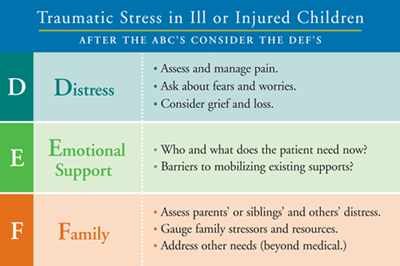
"A-B-C" orients providers to the crucial first steps to save a life (Airway, Breathing, Circulation). "D-E-F" can help providers remember the key initial steps for children's emotional recovery from illness or injury.
Health care providers are experts in treating illness, restoring functioning, and saving lives. After attending to the basics of children's physical health (the A-B-C's), providers can promote their patients' health and recovery by paying attention to the next steps - "D-E-F".

The D-E-F protocol is designed as a practical tool to guide health care providers in implementing trauma-informed pediatric care.
D-E-F helps providers identify what they can do, as they take care of ill or injured children, to address and prevent traumatic stress responses.
Download D-E-F Pocket Cards with quick screening and intervention recommendations.
DISTRESS
Pain
- Actively assess and treat pain.
Fear and anxiety
- Minimize traumatic aspects of treatment / procedures.
- Provide information and choices.
- Listen carefully and clarify misconceptions.
- Ask about fears and worries.
- Provide reassurance and realistic hope.
Grief or loss
- Ask about losses associated with this illness or injury.
- Did patient witness / learn of injury or death of friends / family?
- Consider need for bereavement support.
EMOTIONAL SUPPORT
Current emotional support: Who and what does patient need now?
- Help child and parents identify support needs & effective coping strategies.
- Empower parents to comfort and help their child.
- Encourage child to stay in touch with friends.
Barriers to mobilizing existing supports?
- Are parents able to be with child for procedures?
- Are parents able to help calm and soothe child?
- Do parents understand child's condition & treatment plan?
- Are others in the child's / family's support system aware of current situation and able to help?
FAMILY
Assess family members' distress
- Ask parents, siblings, other family members how they're doing.
- Are any family members having an especially difficult time?
Gauge family stressors and resources
- Help family identify strengths and coping resources.
- Encourage parents to use their support systems.
Address other needs (beyond medical)
- Ask about other current stressors that hamper family's ability to cope with child's illness / injury / hospital stay.
- Connect family with appropriate support services.
Special Considerations in Assessing and Treating Young Children Using the D-E-F Protocol:
Many infants and young children are hospitalized every year with injuries and serious illnesses. Emerging evidence suggests that traumatic stress is a problem for these children as well.
Many of the protocols and materials on this website apply to traumatic stress reactions in infants and young children, but a number of special considerations are warranted. For example, assessment of pain and emotional distress in the youngest children will depend on parent-report and observations of child behavior, rather than child self report.
Parents' presence and support are key for young children dealing with illness, injury, or hospitalization. Supporting parents as they support their child is always important, but even more so for the well-being of the very youngest children.



